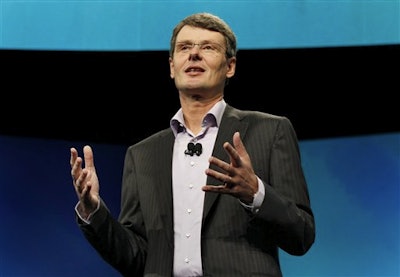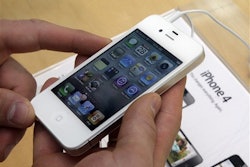
TORONTO (AP) — Research In Motion's new chief executive unveiled a newly-designed BlackBerry smartphone prototype powered by a re-imagined operating system —the very software the company has pinned its future on.
Thorsten Heins, who took the CEO job in January, on Tuesday revealed features of the BlackBerry 10 operating system running on a prototype device at the company's BlackBerry World conference in Orlando. He provided no update on the software's launch date.
Heins, who is trying to rally developers to make applications for the new operating system, promised that each developer at the conference will go home with the prototype BlackBerry. In a speech that was broadcast on the company's BlackBerry World website, Heins stressed that the device is not the finished product.
"We're taking our time to make sure we get this right," Heins said.
The once iconic company has had difficulty competing with flashier, consumer-oriented phones such as Apple's iPhone and models that run Google's Android software.
Investors were not impressed. RIM's stock closed down 82 cents, or 5.7 percent, to $13.48.
Heins made his first major speech since replacing longtime chiefs Jim Balsillie and Mike Lazaridis in January. Lazaridis announced a month earlier that the often-delayed operating system would be delayed again until later this year.
Analysts say RIM's future depends on the new BlackBerry 10 software platform, although many say it may be too late.
"I'm very, very confident we will be there later this year with an exciting product. Make no mistake, this is not the final device, this is not the final hardware," Heins said.
"But it's a very, very important milestone for us."
The prototype BlackBerry has a touchscreen, but no physical keyboard like most BlackBerry models. One of the new features is a modified touchscreen keypad that will allow users to select full words with a single key stroke.
RIM has had limited success trying to enter consumer markets in recent years, particularly with high-end devices that sport touch screens popular with consumers. Touch-screen BlackBerrys that lack physical keyboards have largely flopped.
BlackBerrys also lag iPhones and Android phones when it comes to the number of third-party applications they can run.
The Canadian company has long dominated the corporate smartphone market. Its BlackBerrys are known for their security and reliability. President Barack Obama even refused to part with his BlackBerry after he took office.
But RIM faces threats from the "bring your own device" movement, in which employees bring their personal iPhones or Android devices to work instead of relying on BlackBerrys issued by their employers.
RIM's annual conference comes as the company has been undergoing a comprehensive strategic review for the last three months. Heins acknowledged the difficulties.
"A lot has been said and written about BlackBerry in this time. You've seen, I've seen it and our customers have seen it," Heins said.
"Let me make be very, very clear with you. I'm here because I believe in the unique value that BlackBerry delivers to our customers."
Jefferies analyst Peter Misek, who is in Orlando for the conference, said Heins gave a good speech in front of a bigger-than-expected crowd but said someone at RIM should have given the speech a year ago.
"I just get the feeling that I wish they had it out already. It's going to be a challenge for them. When they launch BlackBerry 10 devices the iPhone 5, Windows 8 and all the Android devices will all be out," Misek said. "It sure does feel like it's getting close to being too late."
RIM declined to hold a presentation for analysts at the conference this year. Colin Gillis, an analyst with BGC Financial, called that a smart move because it kept a sense of doom out of the event.
Gillis said BlackBerry 10 is a solid operating system but it probably won't be enough to turnaround the Canadian company. Gillis said it's more important for them to get it out right than to quickly release a flawed product.
"It's too soon to cast final judgment on the platform. Let's see what they do. Let's see if people build (applications) for the platform," Gillis said from New York.
Kunal Gupta, the founder and CEO of Toronto-based application developer Polar Mobile, said there's no demand from companies to make applications for Blackberry 10 right now and thus they haven't decided to make applications for the new operating system. His company makes applications for Sports Illustrated, CBS Sports, CNN Money and others.
"The market demand is what everybody is going to be watching for now," Gupta said.
Polar Mobile made more about 300 applications for RIM's current operating systems. Gupta, who has attended many of RIM's annual conferences in the past, did not go to this year's gathering.






















